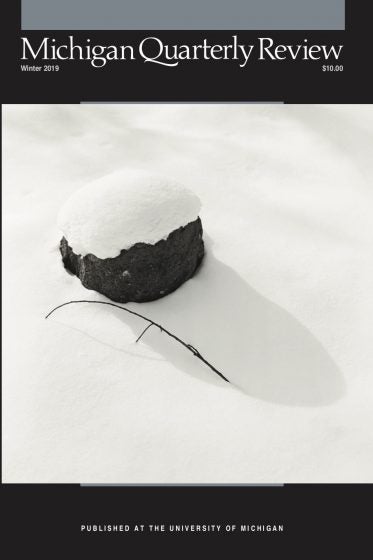“On Contemplating a Second Child,” by Jennifer Case, appears in the Winter 2019 Issue of MQR.
The winter my husband and I debate whether or not to have a second child, I am a new faculty member at a state university. The job is a good one— the promising start of a long and hopefully rewarding career—and yet our daughter is already three. I have six years to prepare for my tenure review; I have a year or two if we want another child close to her age.
Time condenses. I begin to look up articles on whether or not to stop after one child. I read about women who stop at one in order to have more time for their writing, themselves, and their marriages. I read about women who believe female academics pay a high price, that the system is unfair. One writer in the Chronicle of Higher Education says women should have more than one child if they want—and then admits she has two but that she no longer works in academia.
I had researched this topic when we were thinking of conceiving my daughter. I was a graduate student then, trying to figure out how to balance a family and a career. So much of what I read was fearful and negative, describing delayed career plans, discrimination and sexism in the classroom or from the administration. Women with children often tend not to get tenure or promotions. Many of them leave their jobs eventually. The outlook is grim, the writers said. I read the chapters, and my heart jumped a bit, and I gritted my teeth. But a child was what we wanted. I closed the books and turned away. I would do what I needed to do.
This time, I’m less certain. When I read of mothers who are happy and content with one child, I am relieved and happy. I think about all the things we can do now that our daughter is older, now that we don’t have to consider pregnancy or another baby. We can go camping and kayaking. I have more time to write and connect with others. I have the energy to tend a garden and cook elaborate evening meals. I was so exhausted after my daughter was born, it took months for me to be able to do such things again: to juggle the nursing schedule with the time required to slice and sauté onions.
And yet, when I read articles by women who have had more than one child, I long for that, too. It’s as if deciding not to have a second child is the same as saying “no” to parenthood in general. As if it means “I don’t want to do that again.”
A female university professor gives this advice to me and a female friend at a conference: Graduate school is a great time to have children. The friend and I are both young and ambitious. We both are married and would like fami- lies. The advice buoys us, and we begin making plans.
A male university professor to me after I’ve accepted my first full-time, tenure-track job: If you want two children, just go for it. Don’t worry about timing. I smile and nod. I say thank you. I wonder: did he have to worry about timing? Did he have to worry about the exhaustion of pregnancy? About the way other faculty members would look at him before and after the child’s birth—their embarrassed glances at his body and their doubt that he could juggle it all?
A female university professor to me, during my first year at my tenure-track job: You won’t be as productive when your children are young. But it will come back, after. And don’t worry—you should still be able to get tenure even if you don’t have a book. Though she pauses, sympathetic. We both know there are no guarantees.
The winter my husband and I debate having a second child, I read an article about how the number of children our colleagues and friends have influences how many children we want ourselves. Peer pressure without our even realizing it.
Most of the friends I have in my profession have zero children or one child. A few have two. Most of the mentors I know have no children or two children. A few have one. My mother had three. My grandmother had four.
I tally up numbers as if they will tell me something. As if they can assure me of which choice I should make, about what I should do.
Most of the female colleagues I know who have published books have zero children. The males have zero children, or one child, or two children. Many, I realize, after thinking about it more, have two.
A female writer in a panel on motherhood and writing tells a room full of young mothers and aspiring mothers that each child you have is the equivalent of a book.
A friend asks me what it is that I—me, myself—want. I have trouble answering.
I do not want to disappoint anyone. My husband. My parents, anxious for grandkids.
I do not want to disappoint myself. But I also don’t know what might disappoint me in the future. Not having another child? Or having another and realizing my career didn’t turn out how I’d expected?
Early motherhood, for me, was hushed. It was me in the apartment, alone, timing the day with feedings and walks outside when the weather was warm enough, counting down the hours until my husband came home. It was me, nursing my daughter, letting her fall asleep at the breast, so that I could adjust my shirt and reach for a book, turn the pages with my one free hand. I checked the books out from the library, where I’d put her in the Moby Wrap and sway through the aisles, just happy to be out of the apartment, near other people, never mind the quietness of the library and the strange smells from those who spent all day in front of public computers. I’d make my way to the childrearing section and search, desperately, for books about motherhood, books about what my life was turning into and what I had become.
I was like a person wrapped in a cocoon, a person contained by an infant, by the need to feed it, the need to sit there and rock, silently, for hours. I was a person, mouth closed, eyes open, mind wandering through the early mornings, the languid midday, the tepid afternoon, the uneven evening, when she’d cry for hours, the night broken by wails and nursing and shadows…
Purchase MQR 57:5 or consider a one-year subscription to read more.
This essay appears in the Winter 2019 Issue of MQR.







